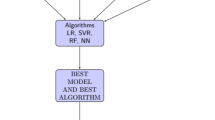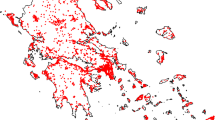Abstract
Among many factors influencing the prices of building plots in rural areas, one can distinguish location factors related to the proximity and availability of many public services and transport hubs, as well as environmental factors, which are mainly related to the proximity of forests, parks or rivers. This paper examines how strongly such attributes of a property influence its price in rural areas. The experiments were carried out using top-notch machine learning methods and real-world data derived from the real estate price register and publicly available geographical data sets. The study showed that environmental features of building plots in a rural area had rather a small impact on their prices whereas location features turned out to be more important.
Access this chapter
Tax calculation will be finalised at checkout
Purchases are for personal use only
Similar content being viewed by others
References
Lasota, T., Sawiłow, E., Trawiński, B., Roman, M., Marczuk, P., Popowicz, P.: A method for merging similar zones to improve intelligent models for real estate appraisal. In: Nguyen, N.T., Trawiński, B., Kosala, R. (eds.) ACIIDS 2015. LNCS (LNAI), vol. 9011, pp. 472–483. Springer, Cham (2015). https://doi.org/10.1007/978-3-319-15702-3_46
Lasota, T., et al.: Enhancing intelligent property valuation models by merging similar cadastral regions of a municipality. In: Núñez, M., Nguyen, N.T., Camacho, D., Trawiński, B. (eds.) ICCCI 2015. LNCS (LNAI), vol. 9330, pp. 566–577. Springer, Cham (2015). https://doi.org/10.1007/978-3-319-24306-1_55
Malinowski, A., Piwowarczyk, M., Telec, Z., Trawiński, B., Kempa, O., Lasota, T.: An approach to property valuation based on market segmentation with crisp and fuzzy clustering. In: Nguyen, N.T., Pimenidis, E., Khan, Z., Trawiński, B. (eds.) ICCCI 2018. LNCS (LNAI), vol. 11055, pp. 534–548. Springer, Cham (2018). https://doi.org/10.1007/978-3-319-98443-8_49
Pagourtzi, E., Assimakopoulos, V., Hatzichristos, T., French, N.: Real estate appraisal: a review of valuation methods. J. Prop. Invest. Finance 21(4), 383–401 (2003)
Peterson, S., Flangan, A.B.: Neural network hedonic pricing models in mass real estate appraisal. J. R. Estate Res. 31(2), 147–164 (2009)
Zhang, C., Fang, J., Yu, T.: A study of real estate demanding index based on massive website log data. In: Proceedings of the 2018 9th International Conference on E-business, Management and Economics, pp. 55–59. ACM (2018)
Tita, G.E., Petras, T.L., Greenbaum, R.T.: Crime and residential choice: a neighborhood level analysis of the impact of crime on housing prices. J. Quant. Criminol. 22(4), 299 (2006)
Anderson Jr., R.J., Crocker, T.D.: Air pollution and residential property values. Urban Stud. 8(3), 171–180 (1971)
Trawiński, B., Lasota, T., Kempa, O., Telec, Z., Kutrzyński, M.: Comparison of ensemble learning models with expert algorithms designed for a property valuation system. In: Nguyen, N.T., Papadopoulos, George A., Jędrzejowicz, P., Trawiński, B., Vossen, G. (eds.) ICCCI 2017. LNCS (LNAI), vol. 10448, pp. 317–327. Springer, Cham (2017). https://doi.org/10.1007/978-3-319-67074-4_31
Trawiński, B., et al.: Comparison of expert algorithms with machine learning models for a real estate appraisal system. In: The 2017 IEEE International Conference on INnovations in Intelligent SysTems and Applications INISTA 2017. IEEE (2017). https://doi.org/10.1109/inista.2017.8001131
Haines-Young, R., Potschin, M.: The links between biodiversity, ecosystem services human well-being. In: Raffaelli, D.G., Frid, C.L.J. (eds.) Ecosystem Ecology: A New Synthesis, pp. 110–139. Cambridge University Press, Cambridge (2010)
Sylla, M., Lasota, T., Szewrański, S.: Valuing environmental amenities in peri-urban areas: evidence from Poland. Sustainability 11(3), 1–15 (2019)
De Nadai, M., Lepri, B.: The economic value of neighborhoods: predicting real estate prices from the urban environment. In: 2018 IEEE 5th International Conference on Data Science and Advanced Analytics (DSAA), pp. 323–330. IEEE (2018)
Rokach, L.: Ensemble-based classifiers. Artif. Intell. Rev. 33(1–2), 1–39 (2010)
Kazienko, P., Lughofer, E., Trawiński, B.: Hybrid and ensemble methods in machine learning. J. Univers. Comput. Sci. 19(4), 457–461 (2013)
Solecka, I., Sylla, M., Świąder, M.: Urban sprawl impact on Farmland conversion in suburban area of Wroclaw, Poland. In: IOP Conference Series: Materials Science and Engineering, vol. 245, no. 7 (2017). https://doi.org/10.1088/1757-899x/245/7/072002
McGarigal, K., Marks, B.J.: FRAGSTATS: spatial pattern analysis program for quantifying landscape structure. General technical report PNW-GTR-351, USDA Forest Service, Pacific Northwest Research Station, Portland, OR (1995)
Jiao, L., Liu, Y.: Analyzing the shape characteristics of land use classes in remote sensing imagery. ISPRS Ann. Photogramm. Remote Sens. Spat. Inf. Sci., I-7(September), 135–140 (2012)
Author information
Authors and Affiliations
Corresponding author
Editor information
Editors and Affiliations
Rights and permissions
Copyright information
© 2019 Springer Nature Switzerland AG
About this paper
Cite this paper
Piwowarczyk, M., Lasota, T., Telec, Z., Trawiński, B. (2019). Valuation of Building Plots in a Rural Area Using Machine Learning Approach. In: Nguyen, N., Chbeir, R., Exposito, E., Aniorté, P., Trawiński, B. (eds) Computational Collective Intelligence. ICCCI 2019. Lecture Notes in Computer Science(), vol 11683. Springer, Cham. https://doi.org/10.1007/978-3-030-28377-3_31
Download citation
DOI: https://doi.org/10.1007/978-3-030-28377-3_31
Published:
Publisher Name: Springer, Cham
Print ISBN: 978-3-030-28376-6
Online ISBN: 978-3-030-28377-3
eBook Packages: Computer ScienceComputer Science (R0)




